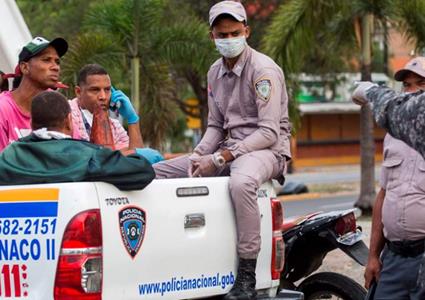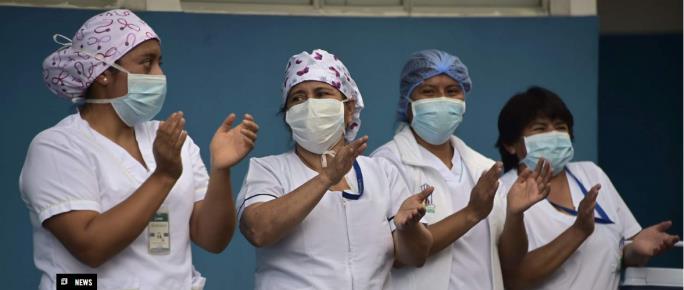|
|
|
|
Amnesty International Bournemouth Poole Christchurch Group
local news & events Amnesty International group for Bournemouth, Poole & Christchurch
by zarganar
|
|
|
|
by zarganar
This month we have a good news item from Colombia and an Urgent Action on Venezuela. The Colombia section explores the data on killings of human rights defenders (HRDs) plus the latest forced evictions and news on anti-personnel mines. We follow the fate of Venezuelan immigrants in Peru, the excessive use of force by the police in Chile, political developments in Venezuela and the granting of unsettling new powers to the armed forces in Ecuador. We provide links to Amnesty’s new films and stories on Women HRDs in Peru and news about a HRD in Chile. Police killings of predominantly Black young men in Rio and indigenous land rights are the focus in Brazil.

COLOMBIA
Good news on last month’s Urgent Action! Since the COVID-19 lockdown started in Colombia, the indigenous community of ASEINPOME faced at least 2 security incidents.
Following pressure, including the appeals from Amnesty International’s supporters, the Technical Investigation Body of the Villavicencio Public Prosecutor’s Office visited the community of ASEINPOME with the intention to identify the attackers and stop them from further threatening the indigenous community. We will be in close contact with the indigenous community to assess their security situation and will swiftly react if there is a new security incident.
The Colombian NGO Somos Defensores (‘We are Defenders) reports that 124 Human Rights Defenders (HRDs) were killed in 2019, the second highest number since the organisation began recording deaths in 2010. This is by far the highest number of HRDs killed in the world (30% of the world’s total). The main reason for this high rate of killings is the ongoing conflict in Colombia in large part fuelled by the enormous profits from cocaine, which encompasses the cultivation of coca, its processing and export to consuming nations.
HRDs killed 2010 to 2019:
| 2010 | 2011 | 2012 | 2013 | 2014 | 2015 | 2016 | 2017 | 2018 | 2019 |
| 32 | 49 | 69 | 78 | 55 | 63 | 80 | 106 | 155 | 124 |
Most HRDs killed were from rural communities who are defending their land rights, many of them indigenous and Afro-Colombian.
HRD’s killed by category:
| Land Rights Defenders | Indigenous Leaders | Afro-Colombian Leaders | Environmental Defenders | LGBTI, Trade Union, Women, Academic | Total |
| 79 | 32 | 5 | 2 | 6 | 124 |
Although most perpetrators are unknown, of those who are known the vast majority were paramilitaries and dissident FARC. Paramilitaries are armed groups that were once linked to the Colombian Army, Dissident FARC armed groups are formed of FARC combatants, who did not lay down their arms in 2016, and the ELN (National Liberation Army) is not in peace discussions with the Government.
Perpetrators of HRD killings:
| Unknown | Paramilitaries | Dissident FARC | ELN | Armed Forces | Total |
| 82 | 21 | 16 | 4 | 1 | 124 |
Somos Defensores also reports that 47 Human Rights Defenders were killed in the first three months of 2020 almost double the number in 2019. Risks to HRDs increased as a result of the arrival of Covid-19 in Colombia. Restrictions on movements have impeded threatened HRDs from moving houses and the National Protection Unit has reduced its services.

The Colombian daily El Espectador reports 3 HRDs killed in the space of 48 hours at the end of June, including. Luz Miriam Vargas Castaño, indigenous woman from Paéz, Cauca, who was killed 26 June 2020. She led the ‘PazAdentro’ project financed by the European Peace Fund.
About 1,300 people of an indigenous community were forcibly displaced in the third week of May from Catrú in Chocó, Colombia. They were fleeing the conflict between various armed groups in their territory.
The magazine New Yorker commissioned a short film Demining sacred space in Colombia’s Amazon basin, which shows how the indigenous Siona people are destroying anti-personnel mines placed by FARC combatants to protect their jungle camps on Siona territory. Mine Action Review notes that ‘Colombia continues to be without an accurate baseline of anti-personnel mine contamination, making it difficult to measure progress, not least because its reporting of survey and clearance is inaccurate.’ [Read more…]
by zarganar
|
|
|
|
by zarganar
The situation for Human Rights worldwide is not improving, but campaigning pays a vital role in protecting and improving human rights. Please continue the great and vital work you are doing ! There are a number of very urgent Actions in this Newsletter. Please take action and distribute as far and wide as you can.
Also check our Facebook page : AmnestyUKEurope and our twitter page @AIUKEuropeTeam for always the latest news and actions.
First some good news ! Thank you for all who wrote letters in support of refugees held on boats on the sea at the coast of Malta. All the refugees have now been accommodated in reception centres.
While rightly the eyes of the world are set on Human Rights violations in the US, at home in Europe, the Polish government continues its relentless crackdown on critical voices of dissent.
Please take action for two Polish activists who are threatened with up to 10 years in jail for a poster campaign accusing the government of manipulating Covid 19 statistics.
Please read the Urgent Action for letter writing.
The solidarity campaign for Elzbieta Podlesna is still on-going. This year she is going to speak on-line together with Vitalina Koval from Ukraine about the challenges of LGBT activism in Eastern Europe. Tune in on Wednesday 1.July at 7pm on www.prideinside.uk
Launching 28th June (include URL which will be live on 19th June) www.prideinside.uk
Hungary is implementing legislation that makes gender recognition for Trans and Intersex people impossible, enshrining in law that only the gender assigned at birth can be recognized. This is exposing individuals to constant discrimination, harassment and attacks. Amnesty International’s Researcher, Krisztina Tamás-Sáróy said:
“This decision pushes Hungary back towards the dark ages and tramples the rights of transgender and intersex people. It will not only expose them to further discrimination but will also deepen an already intolerant and hostile environment faced by the LGBTI community.”
https://www.amnesty.org/en/latest/news/2020/05/hungary/
Please sign and share the digital action. I am attaching a paper version as well. Please send letters before 24th June. In addition I am attaching a blog by Amnesty activist Eva Hibbs from the Southwark group.
Further on Hungary Amnesty International is presenting a new report about discrimination and job insecurity in the workplace due to the COVID-19 crisis.
See the article published by our researcher Krisztina Tamas Saroy
Please also see the full report :-
No working around it: Gender-based discrimination in Hungarian workplaces [Read more…]
by zarganar
This month, we inform you of two new regional campaigns aimed at addressing the impact of COVID-19 on human rights in the Americas. We also report specific COVID-19-related developments and concerns in individual countries. In Colombia, there are reports of further forcible displacements and the targeting of Human Rights Defenders by the security forces. In Brazil, we report on police killings and their encouragement by government figures, including President Bolsonaro. An International Donors Conference has pledged financial support for Venezuelan refugees and migrants. In Venezuela itself, 46 prisoners were killed in an outbreak of violence in a prison. On World Environment Day (5 June), watch out for a new series of stories and videos about Women Human Rights Defenders in Peru battling against toxic contamination. There is concern about the serious situation faced by communities in the Ecuadorian Amazon whose food and water sources have been affected by a recent oil spill. There are Urgent Actions on Colombia, Venezuela and Peru. We say a sad farewell to our Brazil Coordinator, David Palmer.
REGIONAL
 Amnesty has launched a new campaign aimed at persuading authorities across the Americas to avoid resorting to repressive and overreaching measures that unduly restrict human rights in the name of “protecting” people from COVID-19. Amnesty’s Crisis Evidence Lab and regional experts have verified almost 60 incidents in the region that point to governments using arbitrary, punitive and repressive tactics. We have written to the Foreign and Commonwealth Office, urging them (a) to use their influence to persuade these countries to stop the repression and (b) to support them so that they can ensure that the most vulnerable populations have access to basic services.
Amnesty has launched a new campaign aimed at persuading authorities across the Americas to avoid resorting to repressive and overreaching measures that unduly restrict human rights in the name of “protecting” people from COVID-19. Amnesty’s Crisis Evidence Lab and regional experts have verified almost 60 incidents in the region that point to governments using arbitrary, punitive and repressive tactics. We have written to the Foreign and Commonwealth Office, urging them (a) to use their influence to persuade these countries to stop the repression and (b) to support them so that they can ensure that the most vulnerable populations have access to basic services.
Amnesty has also released a report on the dire state of the rights of health workers in the Americas. The report urges countries in the region to prioritise and protect health workers’ rights during and beyond the pandemic.
COLOMBIA
Amnesty International has issued a new Urgent Action on behalf of the indigenous community ASEINPOME in central Colombia. They occupy an area which is under exploration for oil and have seen armed men lurking on their land. The community has received intimidating and extortion calls and has faced racist accusations. These situations were reported to the National Police, but to date no investigation has been started and the security forces have not been present in the locality. The Office of the Prosecutor has been informed of the complaints, however since July 2019 the community has not received any further information from the Prosecutor and their requests have not been answered.
Several organisations have written to the US State Department about the revelations that Colombian Army intelligence units compiled detailed dossiers on the personal lives and activities of at least 130 reporters, human rights defenders, politicians, judges, union leaders, and possible military whistle-blowers. In the recent past, the surveillance is far worse than a massive invasion of privacy. The targeting of political opposition, judicial personnel, human rights defenders, and journalists leads to threats, attacks, and killings. The organisations ask for an independent international enquiry, protection by the Colombian authorities for those under surveillance, purging of the relevant files and that the Colombian government reveal publicly the full extent of illegal intelligence operations.
The Internal Displacement Monitoring Centre reports that 382 people in three different locations were forcibly displaced in the last 2 weeks of April, as violence in rural areas continues through the national quarantine for Covid-19.
Colombia reports 25,366 cases and 822 deaths from Covid-19. Although this is a small proportion for its population of 46 million, the number of cases is growing exponentially and has not been contained by the early establishment of quarantine measures. 5.4 million people became unemployed in April as a result of the lockdown, which has been relaxed, except for the elderly who must remain in quarantine until at least 30 August. [Read more…]